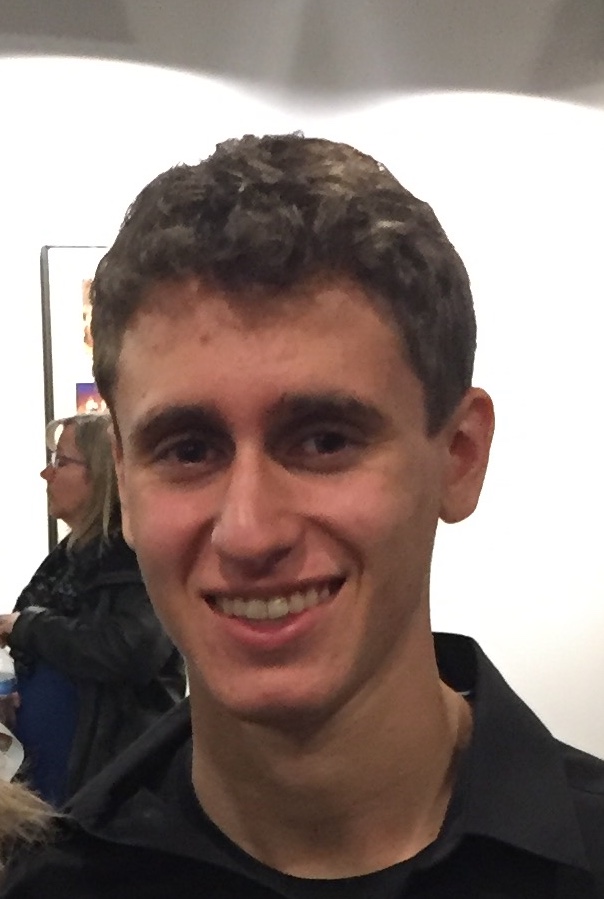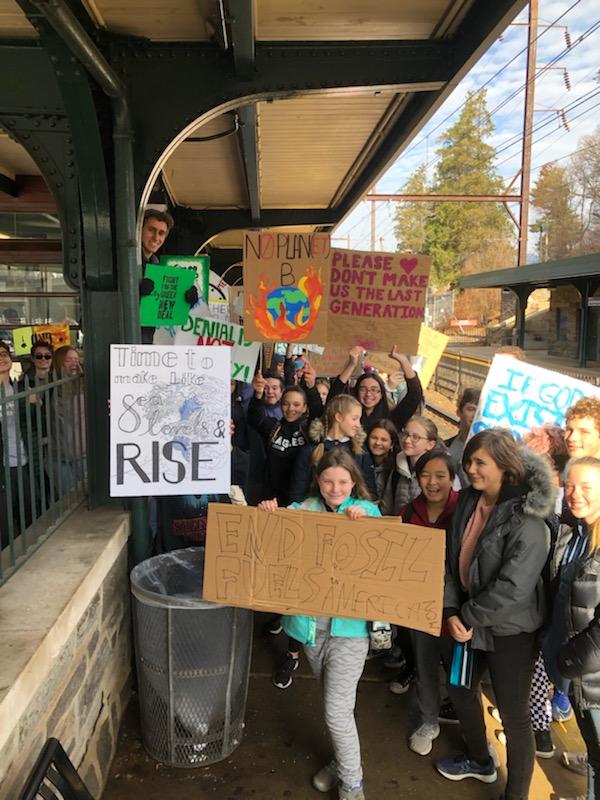Rory Erlich ’14 : High Expectations and Strong Support Marked His Miquon Experience
Now a senior at Abington Friends School, Rory Erlich ’14 was one of six Miquon Class of 2014 graduates who enrolled at AFS. He was close friends with all of them, which influenced his decision, and eased the transition to middle school. Over time, those six moved on and formed other social groups, but all still remain close, bonded by their shared Miquon experience.
Rory’s Miquon memories come quickly. One of his earliest recollections centers around a self-portrait he was asked to draw in 1st or 2nd grade. The prompt was, “I am amazing because …” and although he doesn’t remember exactly what he drew, he does remember feeling special and “amazing” because he got to identify and elaborate on the qualities that he felt made him that way.
What really sticks out for Rory are the long-term projects he was involved with. One, in particular, was the unit on bread that allowed the students to make a variety of different breads—matzoh, tortillas, beignets and loaves created in a bread machine. “We really were learning about different cultures by making the bread that comes from each one,” he says.
He and his friends enjoyed building elaborate domino chains that they would then cascade, creating new mazes and coming up with different ways of getting the chain effect started. One way was tying a ball to a string and dropping it so it hit the first domino, and then down they all would go.
“It really all was genuine learning through play,” he says.
Rory was almost a year older than his classmates and says, “I grappled with that [age difference] a bit, had some self-esteem issues and I was hard on myself, but I was lucky that I had great friends (especially Jonah, who also attends Abington Friends School) who were always helpful and supportive. And I knew I was right where he should be,” he says.
Many Miquon activities don’t rely on age, and Rory cites all-campus tag and spending time with his reading buddies—Julian, Jacob and others—as helping him make valuable connections.
Support system
Rory can list many teachers, staffers and friends from Miquon as having influenced him, but two teachers are top-of-mind.
“Sarah Walsh Aghajanian (3rd and 4th grade) and Lynn Hughes (5th and 6th) were both key to my development,” he says. Sarah recognized that he was strong in math and needed more challenges and supported him in completing workbooks independently and learning fractions outside of class. “I’m so glad that she recognized that and allowed me to work at my own pace, which I really value,” he says.
Around this time, Rory started to do some serious writing. He pulls out one of the small books he wrote in 4th grade, Rory’s Book of Poetry. He also wrote his first persuasive essay—about why the police should enforce laws against graffiti. And The Journal of Quick Raccoon was his entry for the Native American Diary project. He describes the book: “Quick Raccoon was my . . . name, Sneaky Bear and Moonlight were my parents, and Soaring Eagle and Running Bucks were my brothers. I told the (fictional) story of a young boy and some of his adventures.” Rory even included drawings with the journal entries.

All was not rosy for Rory, though, as he struggled to allow other students to have their time. “I would get impatient and wanted individual attention,” he explains. “One time, Sarah was working with another student and I kept bugging her, until she finally sent me to the office. When she eventually came down there, she was nice but straight with me, telling me that I needed to learn patience and respect for others.
“She did it in a way that was not condescending … taking me seriously,” he adds.
Fourth grade was a very difficult one for Rory, as he lost his mother to leukemia during that year. He remembers with gratitude the overwhelming support from individuals and the community as a whole as he struggled with his grief.
During the following two years, Rory also made a special connection with Lynn Hughes and felt a “level of mutual respect and understanding” that he valued.
“She was sage—smart and wise,” he says. “We did a lot of work in that class that was important to me. I was really growing in my writing and got a lot out of the wagon train simulation, where we kept elaborate journal entries of a pioneer traveling west in a wagon train.
“She held us all to high standards and taught things in a sophisticated and nuanced way, and I was engaged with what we were doing. She read To Kill a Mockingbird aloud, which really touched me,” he recalls. “When we were treated that way, we rose up to meet the expectations, and I wanted to do right by her.”
Meeting high expectations
Rory’s placed high expectations on himself, as well. He recognizes his affinity for problem solving; for seeing something in an entirely new way and coming up with tools and techniques to figure out a solution. A recent experience with a summer math program identified this quality for him when he realized he needed to move beyond rote learning. This “ah-ha” moment was exciting for him, so much so, that he spoke with his math teacher at AFS after sophomore year and was allowed to introduce an inquiry-based math study with an expedited math curriculum that he is now doing with two other students.
Three students and the teacher (who took a special training course in New Hampshire to learn how to formulate and run the program) meet four times a week and have homework every night. The curriculum for this multi variable calculus class consists of 400 questions. The students learn the material as they answer the questions. Each student also does independent investigations, looking deeply into something they have learned and proving something new.
Rory reads an example of one of the questions they are faced with:
Find the point on the plane ax + by + cz = d that is closest to the origin. What is the distance from the origin to this plane? Your answers will of course depend on a, b, c, and d.
Another problem challenges the students to prove that the shortest path between two points on a sphere is one that is part of a larger circle that cuts the sphere in half.
Rory continues to hold himself to high standards including receiving an early decision offer of admission to Tufts University, where he wants to major in math. Why Tufts? “It’s a good school, medium-sized, near a major city, but with a distinct campus, with a solid math department and solid offerings across the board,” he says. The fact that it’s located within a reasonable distance of his home is a plus. Tufts also has a known activist presence on the campus, which ties into another driving force in his life.
Concerned about the world’s climate crisis, he has become invested in volunteer work as a climate activist. “It’s hard for me to see that NOT playing a role [in my further education], but will it be academic or extra-curricular?” he asks. “I’m not sure yet, but I hope to combine the two. I am really motivated and feel a sense of responsibility and urgency around the climate,” and it’s an area where he can achieve a lot collaboratively with others who hold the same views, he adds.
In the summer before senior year, Rory completed a program at The University of Pennsylvania where he did research, charting possible links between fracking in Pennsylvania, West Virginia and Ohio and its effects on the agriculture industry and the correlation to various changes in agriculture.
He also joined and co-led the Environmental Club at AFS, and helped to activate the Sunrise Movement there, a youth-led group building a grassroots mobilization to fight for a Green New Deal.

Rory ’14, holding the green sign, along with other students from AFS who came out for the December 6, 2019 climate strike.
“I started going to meetings, facilitated a summit in Rhode Island and transformed the Eco Club into a branch/hub of the movement. I’ve done a lot of work to get kids out on the climate strikes.”
Getting other kids out extends to an offer he made to Miquon to involve 5th and 6th graders. The next climate strike is planned for April 22-24 (Earth Day 2020 is April 22) and he is hopeful he can work with administration and faculty at the school to bring those students out for it.
“I’ve always felt passionate about the climate and concerned about seeing the world crumbling around me,” Rory says. “This work has given me a voice and an outlet for that concern.” He’s considering taking time off before college to organize with Sunrise and join others working for a Democratic challenger ahead of the 2020 presidential election in November. “I can definitely see myself being involved, maybe in canvassing, or more.”